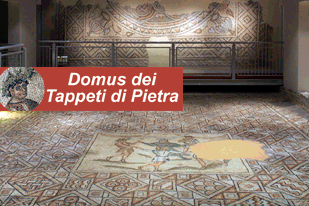Ecclesio Bishop of Ravenna
Ecclesio Bishop of Ravenna 522-532. Hotel near religious monuments in the centre of Ravenna..
Photo: 1)la Basilica of S.Maria Maggiore,2)il campananile on the backside,via Traversari,3)la Basilica of S.Vitale, from S.Maria Maggiore, 4)S.Apollinare in Classe, the mosaic of Ecclesio, 5)S.Apollinare in Classe, the mosaic of Ursicino
In the summer of 535 Amalasunta was killed in Bolsena.
The unlucky Queen reigned in the years 521 - 535 during the episcopacy of Ecclesio (522 - 532) and the beginning of the episcopacy of Ursicino (534 - 536), who started the erection of Santa Apollinare Basilica in Classe , the work was soon interrupted by the burst of the Greek-Gothic war in Italy. During those difficult years, civil and religious bishops' authority reached its highest level.
Ecclesio showed his authority beginning the building of a hall inspired by the imperial Triclinium in Constantinopoli.
He erected the church of Santa Maria Maggiore, in Via Galla Placidia, (the first church in Ravenna with an image of the Madonna and the title of "Madre di Dio") and started the edification of San Vitale church exactly on the site of his martyrdom.
Behind these enterprises there is always a great backer, Giuliano Argentario.
The church was continued under Vittore and completed by Maximian , as two monograms on some capitals attest. (the two imperial panels were supposed to be originally dedicated to Vittore and lately to Bishop Maximian).
Ecclesio was elected with the support of Theodoric and with this double religious and political role he accompanied Pope John I to Contantinople -The Pope on his way back home was imprisoned by Ostrogoths and died shortly after.
Theodoric was dead, Ecclesio enforced the Bishop's power over the clergy, obtaining from Pope Felix IV an important concession for the Western Church that Ravenna respected until the final schism at the end of VII century.
Starting from what had already been established by the first Popes, the document ratified clergy's rights and duties: the clergy enjoyed the fourth part of the whole Church's income but they were not allowed to look for external protection to obtain promotions or benefits.
It condemned the clergy's participation in worldly shows, recognised the bishop's right to regulate monastery life and limited the concession of the ecclesiastic patrimony to laics.
Prof. Gianni Morelli
The pleasure of fine accommodation in the centre of Ravenna: we recommend the Fabbri hotels for a pleasant stay as follows:
The Centrale Byron Hotel, 3-star hotel in the centre of Ravenna, close to the main momuments;
The Bisanzio Hotel, 4-star hotel in the centre of Ravenna, close to the main momuments;
Once you have reached the hotel and parked your car, forget it and walk everywhere, because everything is within walking distance.
The railway station is near and within walking distance also.
© reserved copyright






